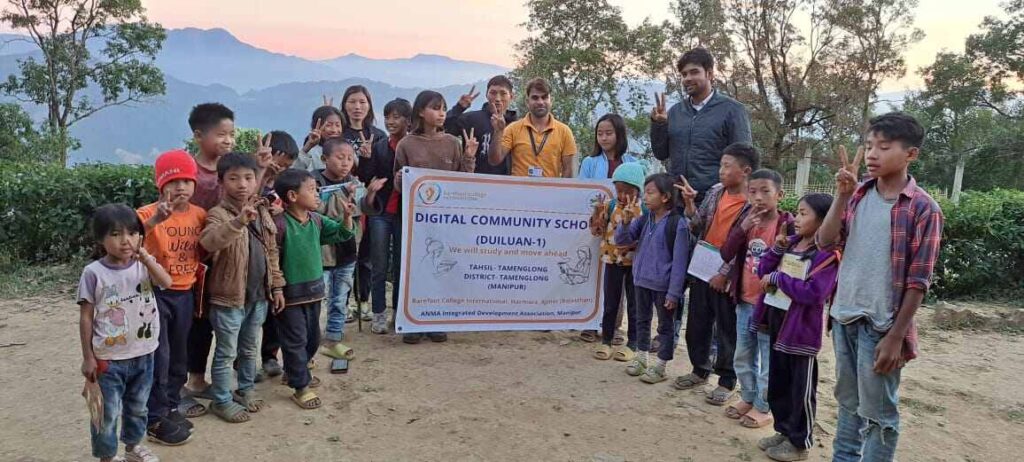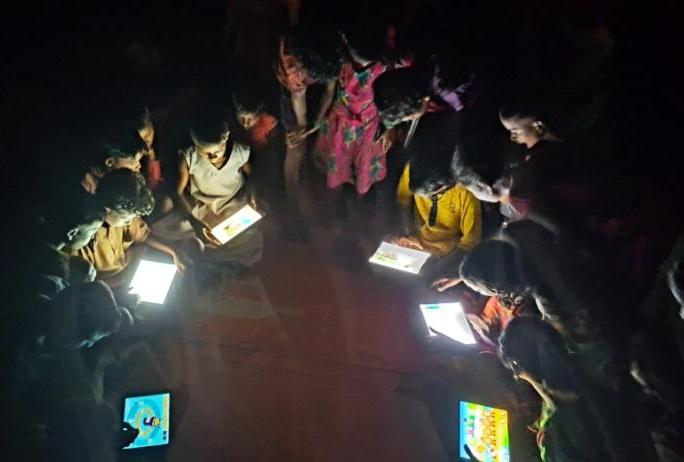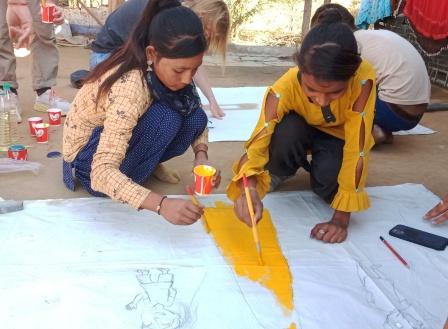Imagine a 10-year-old child from a remote village in Manipur, Rajasthan or Assam reading learning about sustainability, climate change, reading books in English or solving complex mathematical problems! This is exactly what non-profit organization Barefoot College International (BCI) is doing among underprivileged children in India through their digital community school programme.
Talking about the same, Mr Harsh Tiwari, Director, BCI India, shared, “Barefoot College International (BCI) is a globally recognized Section-8 social enterprise with headquarters at Harmara village in Kishangarh tehsil of Ajmer district (Rajasthan). It has been working with last-mile rural communities in 17 states in India and many countries in the global south, providing services and solutions to the challenges facing rural poor communities for more than 7 years, intending to make them self-sufficient and sustainable, value and respect the knowledge and wisdom they already possess.”

Digital Community School
Quizzed about their Digital Community School programme, the Director informed, “Our learners today will lead their communities tomorrow, responsibly. With this vision, BCI has developed the Digital Community School (DCS) model as a standard for contextualized learning. With the Solar Edu Box digital toolkit, a climate and sustainability curriculum and a rural teachers training fellowship, DCS creates off-grid offline hubs for exploratory learning. Currently, we are running 13 DCS in 5 states in India.
During the pandemic, all these schools functioned through an effective blended remote learning model, with renewed curriculum promoting community health and wellness, and training parents in education – which have now become an integral part of BCI’s post-pandemic strategy.”
Working in six Indian states
Since when is this program running and in which parts of India? Answering that, the Director said, “The evolved model of DCS which has a focused approach on extensive digital integration and a renewed curriculum promoting climate leadership and sustainability education, community health and wellness, and training parents in education has been running since 2021. We are currently running DCS in Rajasthan, Himachal Pradesh, Karnataka, Manipur, Odisha, and Assam. We are planning to scale the model using our climate leadership and sustainability education curriculum and teachers’ training program, with emphasis on children and parents across many last-mile and marginalized communities in India.”

Sustainability Education, focus on girl children
Apart from regular education, children are also being made aware about sustainability, climate change and health among others. To bridge the existing gender gap in education, especially in rural areas of India, additional focus is being given on educating girl children.
“The teaching and learning frameworks are designed to move beyond skill-based schooling towards relatable sustainability education that ignites the child to think, speak and act on matters of Sustainable Development Goals (SDGs) through curricular modules on Gender and Inclusion, Climate action & conservation, good health and wellbeing. Additionally, innovative grassroots-tested modules on Financial leadership, leadership and storytelling are in the making. We are proud to share that with a focus on girl children, BCI has trained 3000+ rural students in formal schools and 250+ teachers on this unique climate and sustainability curriculum,” informed Mr Tiwari.
Talking about sustainability education, he added, “BCI Education and Wellness interventions are designed to prepare the next generation for survival, success and self-reliance in tomorrow’s world. Sustainable education, in particular, focuses on nurturing learners to become creative, introspecting, confident individuals with a tolerant view towards diversity, and pride towards their heritage. This will equip them to be leaders of the future with academic, vocational and other capabilities to be able to make positive sustainable choices. Instead of a ‘ very hard coded’ curriculum, BCI has prepared a flexible framework with scope for local contextualization and covers topics like Gender, Climate leadership and Sustainability, Health and nutrition, Digital Citizenship, SEL, Citizenship, WASH, Financial literacy, and Aspirations building.”

Inspiration
What was the inspiration behind starting this program? Responding to this, the Director expressed, “The access and quality of education our children receive have been a point of contention for the longest. Even to this day, we have communities in far-flung rural areas that do not have access to schools or where children are required to hike 5-10 kilometres to receive education. There still are locations that are inaccessible due to difficult terrains, communities that are not connected to the grid electricity and communities where integration into formal schools becomes difficult due to language barriers. With these existing concerns, children are either forced to drop out of school or are often graduating from the system with a knowledge and skill gap.
To break through the vicious cycle of poverty, a marginalized rural child of today needs to have the capability to survive and succeed two decades from now, in a dynamically altered planet with very different jobs than today. Hence, the DCS model was developed, keeping in mind that any skills of today will be irrelevant tomorrow, except the skill of knowing ‘how to learn’ fast, and building elements of leadership in oneself.”

“In addition, the model emphasizes building climate leadership as climate change will be a critical issue of tomorrow in these communities. Being rapidly adaptive to skill requirements might help one survive in the future. However, from the lens of the planet as a whole, every individual must empathize with other humans, other life forms and nature. Therefore, contextualized learning is the key and requires the engagement of multiple stakeholders beyond students, such as teachers, parents, community members and local governance,” he further said.
Focus on women empowerment
Not just children, the non-profit organization is also working towards women empowerment especially in rural areas. “The organization places women at the centre of its development work which ranges from innovative programs in Access to Renewable Energy, Education, Women’s Economic and Digital Participation, Enterprise, and Women’s Wellness; by and through rural women. Apart from this, BCI Solutions produce results for 14 of the 17 UN Sustainable Development Goals,” expressed Mr Tiwari.
Accolades
The Director also shared information about the recognitions which Barefoot College International has earned from across the world for its performance.
“BCI has replicated and scaled its work through the establishment of campuses in India, Senegal, Zanzibar, Madagascar and Fiji. In 2021. In 2022, BCI was awarded the Bhamashah Award by the Rajasthan Government. Recently, the 2022 Presidential Environmental Medal by the President of the Republic of Guatemala was presented to Barefoot College International (BCI) for its environmental work in Guatemala,” he signed off.
Ahana Bhattacharya can be reached at ahana@thecsrjournal.in

